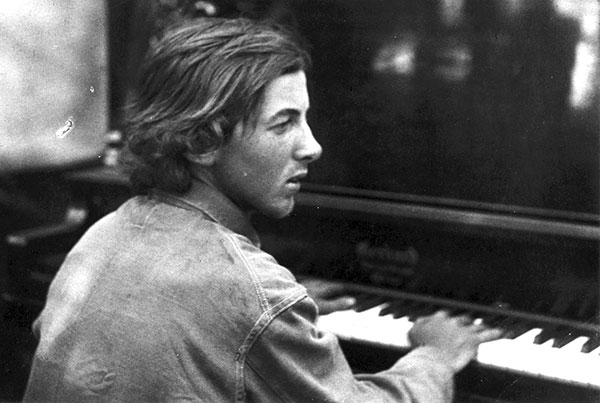but the shame of sentencing the man to prison, and it endures today

Henry Cowell at the Forest Theater, Carmel, 1913 (we were all once very young)
Henry Cowell, born in the last years of the 19h century, was a brilliant composer, one of the wildest, most original of the 20th century, and his work remains radical today in the 21st. He was also a magnificent pianist, in great demand all over the world while still in his 20s. Two months after his 40th birthday he was arrested in his Menlo Park home on a 'morals' charge, and two months after that he began a 15-year term in San Quentin prison. He was paroled after four, and pardoned two years after that.
Joel Sachs' short 2013 account of Cowell's public martyrdom is essential reading on the subject. The year before Sachs had published a major study of the composer, musician and theorist: "Henry Cowell: A Man Made of Music".
I have not read the book. As someone very much on the outside of musical theory, even outside of musical practice, I'm not likely to, and yet, as a fan and as a queer, I feel very connected to Cowell's story.
I was born the year Cowell's family, friends and many major composers and musicians were finally able to persuade the California authorities to release him early. Unfortunately, for the rest of us the nightmare was still not over. I remember very well the era of entrapment, prison, and violence that continued for another generation, and beyond. Brutal laws and brutish attitudes warped the personalities, aspirations, careers, dreams and loves of millions, when they did not actually physically cripple or murder the victims. I was lucky to have escaped physically, but there was serious internal scarring. Some of my friends were less fortunate.
Sadly, the hatred and the violence continues all over the world, and it has not disappeared in the U.S.
Note: I published this post after hearing a piece by Cowell this morning on the excellent internet station, Counterstream Radio. "Atlantis" was composed for dance; it includes a small ensemble and three singers moaning wordlessly in sexually explicit ways. The mission and the operations of both Counterstream and its parent, New Music USA, are described by their names. Cowell's music lives today; it's still going against the stream and it's still new.
[image from OUPblog]